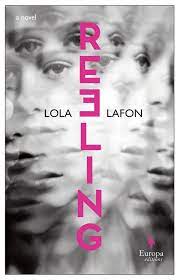Though this new year comes with its own shares of doubts and questions, what remains certain is that new titles and texts from around the world hold their own promises of enthrallment, knowledge, and beauty. This month, we present three works of fiction that traverse the realms of history, politics, and family. From a new collection of stories from Japanese master Jun’ichirō Tanizaki, to a novel interrogating the psychologies surrounding sexual predation by the award-winning Lola Lafon, to an imaginative journey into turn-of-the-century Barcelona with Eduardo Mendoza—these writings are sure to keep you thinking and dreaming.

Reeling by Lola Lafon, translated from the French by Hildegarde Serle, Europa Editions, 2022
Review by Barbara Halla, Assistant Editor
What we may reflexively call the “#MeToo era” has served as a cataclysm for the publication of several books of fiction and memoirs centered around women’s experiences with sexual violence. Far from being an Anglo-centric phenomenon, French works such as Vanessa Springora’s Consent (translated by Natasha Lehrer) and Camille Kouchner’s La Familia Grande (translated by Adriana Hunter) have garnered great acclaim for their unflinching and complicated portrayal of childhood sexual abuse. Lola Lafon’s Reeling, as well, lends itself easily to this movement, seeming particularly prescient considering the recent conviction of Ghislaine Maxwell for her role in the trafficking of underaged girls. The novel’s direct protagonists, Cléo and Betty, are two women whose lives are derailed by the Maxwell-like figure of Cathy—a stylish older woman who approaches young girls between thirteen and fourteen, offering them prestigious scholarships through the fictive Galatea foundation.
As Cathy prepares the girls for their “interviews,” she plies them with cares and attention, clothing and expensive perfumes; she makes them feel special, or rather that they are destined for something special. Yet, it is clear that something far more sinister hides behind the promises of scholarship. By the time the girls are to “interview” with the older male jurors, Cathy has earned their trust and affection; they would do anything to please her, to deserve her trust, to fulfill her expectations as she emphasizes the need for maturity and openness, the main criteria these “jurors” are looking for in the candidates.
Two important elements come to the fore in the figure of Cathy and her relationship to the young girls she grooms, and also in the encounters of girls like Cléo, Betty, and dozens of others with these older men. On the one hand, it is important to unpack the way Cathy manufactures consent through manipulation: although these girls do not want to do anything of a sexual nature during their “interviews,” many decide to go forward with it—not solely because of their own ambitions, but also to please a figure they have come to trust and revere. Secondly, the “jurors” themselves prey on the girls’ desire to appear mature, to show they are not “frigid” and thus somehow inadequate. This particular mind-game speaks also to the way sexual liberation—the result of the social and political movements that swept France during the 1960s and 1970s—often framed physical freedoms in ways that prioritized women’s and girls’ availability to men. As a thirteen-year-old Cléo thinks after her assault, “Cléo, thirteen years, five months, and however many days, had consented. To say no was to be frigid.” READ MORE…

